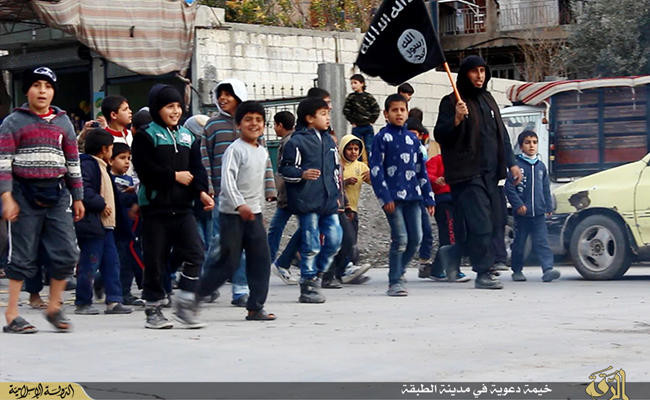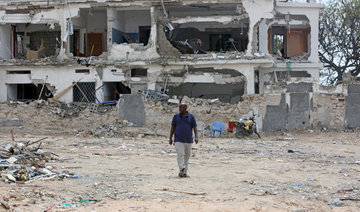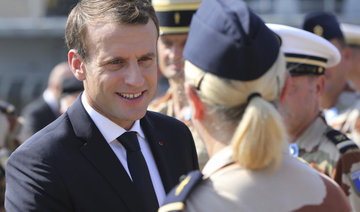LONDON: A 9-year-old boy who stood up in class to declare his support for Daesh after seeing execution videos online is among more than 2,000 British children, including over 500 girls, identified as potential extremists according to data released by the UK government on Thursday.
The London schoolboy, given the pseudonym Haaruun, watched videos of beheadings and people being burned by Daesh after searching for extremist material online in the wake of the Paris attacks two years ago, the Home Office told Arab News.
Government figures released yesterday, the most detailed so far on the number of people referred to the government’s de-radicalization program Prevent, revealed that nearly a third of referrals were of people under the age of 15 and more than half under the age of 20.
In total, 7,631 were referred to the scheme during a 12-month period up to the end of March last year, 5,000 of whom were reported in relation to concerns about extremist sympathies toward groups like Daesh and Al-Qaeda, while 759 were linked to right-wing extremism, according to UK media.
More young people than ever are now being reported, heightening concerns about the access to online extremist material. In some cases, children as young as 5 or 6 have been sent for help due to the involvement of older siblings in terrorist activity.
Amber Rudd, the home secretary, is currently meeting tech giants in the US to discuss concerns about the availability of extremist content on the Internet.
Social media companies have come under fire in recent months for failing to take a more aggressive stance in tackling online extremism.
Commentators say a much more proactive commitment is needed from tech companies to combat the mounting threat.
“Terrorists and violent extremists rely heavily on social media and online communication platforms such as YouTube, Telegram and Twitter to spread their ideologies. As a result, disrupting those networks and removing terrorist propaganda are vital steps towards preventing radicalization and its consequences,” Mark Wallace, CEO of the Counter Extremist Project (CEP), told Arab News.
“We have seen some progress from certain companies on this front, but that has come only after significant criticism, reputational damage and threats from lawmakers. Tech companies have been far too reluctant to meet their ethical obligations to better protect their users and customers, who number among those killed by terrorist violence,” he added.
A recent report from the World Economic Forum’s human rights council warned that tech companies could be subject to government regulation limiting freedom of speech unless they “assume a more active self-governance role.”
Earlier this year, British Prime Minister Theresa May and French premier Emmanuel Macron met in Paris to launch a joint campaign to tackle online radicalization.
“In the UK we are already working with social media companies to halt the spread of extremist material and poisonous propaganda that is warping young minds,” May said.
The prime minister has also urged Internet companies to be quicker in identifying and taking down extremist content, calling for the average 36-hour removal period to be reduced to two hours.
In June, tech companies including Facebook, YouTube, Twitter and Microsoft teamed up to launch the Global Internet Forum to Counter Terrorism, pledging to share best practices and “define standard transparency reporting methods for terrorist content removals.”
A Twitter report revealed that the platform suspended 935,589 accounts for promoting terrorism between the beginning of August 2015 to end of June 2017. Data shared with Arab News also highlighted Twitter's use of “faster, more efficient, and smarter” anti-spam tools to get terrorist content off the platform.
A spokesperson from YouTube said: “Online extremism is a complex problem and addressing it is a critical challenge for us all … We are making significant progress through machine-learning technology, partnerships with experts, and collaboration with other companies through the Global Internet Forum — and we know there is more to be done.”
With the disintegration of Daesh’s self-proclaimed caliphate, concerns are mounting over the thousands of extremists expected to return home and the increasing presence of terror groups online.
“The defeat of Daesh on the battlefield will only make the group’s online engagement all the more important to its continued relevance and ability to inspire acts of violence,” Hany Farid, a professor of computer science at Dartmouth College in the US, told Arab News.
At an Intelligence and National Security Summit in September, top terror chiefs from the US, Britain, Germany and Canada called for greater cooperation from social media platforms to combat the growing threat from lone-wolf attacks perpetrated by self-radicalized individuals.
“We know that social-media platforms and video-sharing sites are the main avenues for terrorist content corrupting vulnerable individuals. And we know that the technological means exist to better thwart the spread of this content. So why isn’t more being done?” Farid said.
Terrorists are using the online sphere for a variety of functions, including recruitment, plotting, sourcing materials and coordinating attacks.
“Terrorist content continues to be prominent in the online space, as it is easily accessible and free to those seeking it. Platforms like YouTube, Facebook, Twitter, and Telegram are just some of the places, but not the only places, where content can be shared,” Farid continued.
“They are also frequently the first point of exposure for individuals who will subsequently seek out more content.
“If the tech giants do not earnestly take action against this development, online radicalization will become an even greater threat than it is today.”
9-year-old British boy ‘pledged support for Daesh after watching terror videos’
9-year-old British boy ‘pledged support for Daesh after watching terror videos’

Taliban arrest 14 people for playing music and singing
Wedding halls are no longer allowed to play music
KABUL: Taliban authorities have arrested 14 people in northern Afghanistan for playing musical instruments and singing, activities they restricted since taking power, provincial police said on Saturday.
The Taliban government has steadily imposed laws and regulations that reflect their austere vision of Islamic law since seizing power in 2021.
This includes cracking down on music in public, from live performances to playing at gatherings, in restaurants, in cars or on radio and TV.
The police said in a statement that on Thursday night in the capital of northern Takhar province “fourteen individuals... took advantage of the nighttime to gather in a residential house where they were playing musical instruments and singing songs, which caused disturbance to the public.”
Those detained were under investigation, it added.
After their takeover, Taliban authorities shuttered music schools and smashed or burned musical instruments and sound systems, saying music caused “moral corruption” and public disturbance.
Wedding halls are no longer allowed to play music, though segregated women’s sections often do so secretly.
Many Afghan musicians fled the Taliban takeover out of fear or in need of work after losing their livelihoods in one of the world’s poorest countries.
The Taliban authorities have encouraged former musicians to turn their talents to Islamic poetry and unaccompanied vocal chants — the only forms of music allowed under their previous rule from 1996-2001.
Newly elected Reform UK councillors face scrutiny over Islamophobic social media posts

- Party made major breakthrough at last week’s local elections
- Campaign group: ‘They have yet to drop any of the candidates that have been exposed’
LONDON: Up to a dozen newly elected councillors from Reform UK have been accused of posting Islamophobic and far-right content on social media, The Guardian reported on Saturday.
It comes a week after the party made a major breakthrough in local elections across the country, winning 677 of the more than 1,600 contested seats.
Reform UK councillors at three country councils have shared social media content from Britain First, a far-right party known for its anti-Islam views.
Paul Harrison, who was elected to Leicestershire’s county council, retweeted and voted “yes” to an X poll asking if the UK should conduct mass deportations.
The post was accompanied by an image, generated by artificial intelligence, of Muslim men holding Pakistani flags.
Reform UK officials are facing greater scrutiny in the wake of the local elections, with many of the social media posts being revealed by counter-extremism campaign group Hope Not Hate.
Its director of campaigns, Georgie Laming, said: “(Party leader) Nigel Farage has claimed that Reform UK have the ‘most in-depth vetting procedure’ of any party. Our investigation shows that their processes leave much to be desired.
“Not only have they admitted using ‘AI techniques and other things’ to do the vetting, but Reform UK continue to shirk responsibility for their candidates’ online behaviour. They have yet to drop any of the candidates that have been exposed.”
The campaign group previously uncovered Islamophobic content posted by Reform candidates on social media, as well as far-right conspiracies and support for extremist figures including Tommy Robinson and David Irving.
Nigerian state bans petrol aiming to curb militant attacks

- “I have directed the immediate ban on the sale of petrol in Bama town,” Borno state governor said
- The ban is part of the “state government’s strategic response to counter insurgency operations“
KANO: Nigeria’s northeastern state of Borno, the epicenter of the militant insurgency, on Saturday said it was banning the sale of petrol in a bid to curtail a resurgence of militant attacks.
“I have directed the immediate ban on the sale of petrol in Bama town, ...and other parts of Bama Local Government Area with immediate effect,” Borno state governor Babagana Umara Zulum was quoted as saying in a statement issued by his office.
The ban is part of the “state government’s strategic response to counter insurgency operations,” the statement added.
The cutting of fuel supplies for vehicles is expected to restrict the militants’ mobility.
The town targeted by the ban is the largest after the state capital Maiduguri, and sits on the fringes of Sambisa forest, a major enclave of the Islamic State West Africa Province (ISWAP), a splinter group of Boko Haram.
The town witnessed the worst devastation by Boko Haram militants who seized it in 2014 and killed hundreds of residents.
Northeastern Nigeria has seen an upsurge in Islamist militant attacks in recent weeks, reigniting a grinding 16-year conflict that has left more than 40,000 dead and displaced some two million people.
More than 100 people have been killed in the region since April.
The state of Borno in particular, where the Boko Haram militant group emerged 16 years ago, remains the epicenter of the conflict in Africa’s most populous country.
Recovery of sunken yacht in Italy suspended after diver’s death

- The diver was part of a team working to raise the 56-meter “Bayesian” yacht
- The yacht sunk within minutes after being struck by something akin to a mini-tornado
ROME: Work to raise a superyacht that sank in Sicily last year, killing a UK tech mogul and six others, was suspended Saturday after the death of a specialized diver, according to local news reports.
The diver was part of a team working to raise the 56-meter (185-foot) “Bayesian” yacht that was struck by a pre-dawn storm in August last year while anchored off Porticello, near Palermo.
The yacht sunk within minutes after being struck by something akin to a mini-tornado, killing British tech tycoon Mike Lynch, his teenage daughter and five others.
Authorities suspended work on raising the vessel after prosecutors opened an investigation Friday into the death of a 39-year-old diver, according to Italian media.
According to initial reports, the diver was part of a team working to cut and remove the 75-meter mast, a first step before recovery of the yacht itself, which is lying on its side on the seabed some 50 meters down.
TMC Marine, the British company working to raise the superyacht, did not immediately respond to an AFP request for more information.
In a statement Friday cited by news reports, TMC Marine said it was cooperating with the probe and that “the circumstances of the accident are currently being investigated by the authorities.”
Work to bring up the yacht began last week, with Italy’s coast guard saying it would take up to 25 days.
Inquests into the deaths of the five British victims of the yacht sinking are currently being held in Ipswich, in eastern England.
In Italy, prosecutors in Termini Imerese have opened investigations into the captain and three others on suspicion of manslaughter and the crime of negligent shipwreck.
Lynch, the 59-year-old founder of software firm Autonomy, had invited friends and family onto the boat to celebrate his recent acquittal in a huge US fraud case.
Ukraine and its allies push for a 30-day ceasefire starting Monday

- Saturday also marked the last day of a unilateral three-day ceasefire declared by Russia
- The leaders of France, Germany, Poland and the United Kingdom arrived together at the train station in Kyiv, and met Zelensky
KYIV: Ukraine and its allies are ready for a “full, unconditional ceasefire” with Russia for at least 30 days starting Monday, Ukrainian Foreign Minister Andrii Sybiha said Saturday.
His remarks came as the leaders of four major European countries visited Kyiv to push for Moscow to agree to a truce and launch peace talks on ending the nearly three-year war. They followed what Sybiha said was a “constructive” phone call between them, US President Donald Trump and his Ukrainian counterpart, Volodymyr Zelensky.
Saturday also marked the last day of a unilateral three-day ceasefire declared by Russia that Ukraine says the Kremlin’s forces have repeatedly violated.
In March, the United States proposed an immediate, limited 30-day truce, which Ukraine accepted, but the Kremlin has held out for terms more to its liking.
The leaders of France, Germany, Poland and the United Kingdom arrived together at the train station in Kyiv, and met Zelensky shortly after to join a ceremony at Kyiv’s Independence Square marking the 80th anniversary of the end of World War II. They lit candles at a makeshift flag memorial for fallen Ukrainian soldiers and civilians slain since Russia’s invasion.
The visit marked the first time the leaders of the four countries had traveled together to Ukraine, with Friedrich Merz making his first visit to Ukraine as Germany’s new chancellor.
Sybiha on Thursday called the Russian truce a “farce,” accusing Russian forces of violating it over 700 times less than a day after it formally came into effect. Both sides also said attacks on their troops had continued on Thursday.
“We reiterate our backing for President Trump’s calls for a peace deal and call on Russia to stop obstructing efforts to secure an enduring peace,” the leaders said in a joint statement.
“Alongside the US, we call on Russia to agree to a full and unconditional 30-day ceasefire to create the space for talks on a just and lasting peace.”
Retired Lt. Gen. Keith Kellogg, Trump’s special envoy to Ukraine and Russia, said Saturday that a “comprehensive” 30-day ceasefire, covering attacks from the air, land, sea and on infrastructure, “will start the process for ending the largest and longest war in Europe since World War II.”
Trump has pressed both sides to quickly come to an agreement to end the war, but while Zelensky agreed to the American plan for an initial 30-day halt to hostilities, Russia has not signed on. Instead, it has kept up attacks along the roughly 1,000-mile (1,600-kilometer) front line, including deadly strikes on residential areas with no obvious military targets.
On Saturday morning, local officials in Ukraine’s northern Sumy region said Russian shelling over the past day killed three residents and wounded four more. Another civilian man died on the spot on Saturday as a Russian drone struck the southern city of Kherson, according to regional Gov. Oleksandr Prokudin.
Speaking to reporters in Kyiv, French President Emmanuel Macron said: “What’s happening with Poland, Germany and Great Britain is a historic moment for European defense and toward a greater independence for our security. Obviously, for Ukraine and all of us. It’s a new era. It’s a Europe that sees itself as a power.”
Trump said last week that he doubts Russia’s Vladimir Putin wants to end his war in Ukraine, expressing new skepticism that a peace deal can be reached soon, and hinted at further sanctions against Russia.
Progress on ending the war has seemed elusive in the months since Trump returned to the White House, and his previous claims of imminent breakthroughs have failed to come to fruition.
Trump has previously pushed Ukraine to cede territory to Russia to end the war, threatening to walk away if a deal becomes too difficult.
Ukraine’s European allies view its fate as fundamental to the continent’s security, and pressure is now mounting to find ways to support Kyiv militarily, regardless of whether Trump pulls out.
Ukrainian presidential aide Andrii Yermak, who met the European leaders at Kyiv’s main train station, wrote on Telegram earlier on Saturday: “There is a lot of work, a lot of topics to discuss. We need to end this war with a just peace. We need to force Moscow to agree to a ceasefire.”
Later in the day, the leaders began hosting a virtual meeting alongside Zelensky to update other leaders on the progress being made for a future so-called “coalition of the willing” that would help Ukraine’s armed forces after a peace deal and potentially deploy troops to Ukraine to police any future peace agreement with Russia.




















